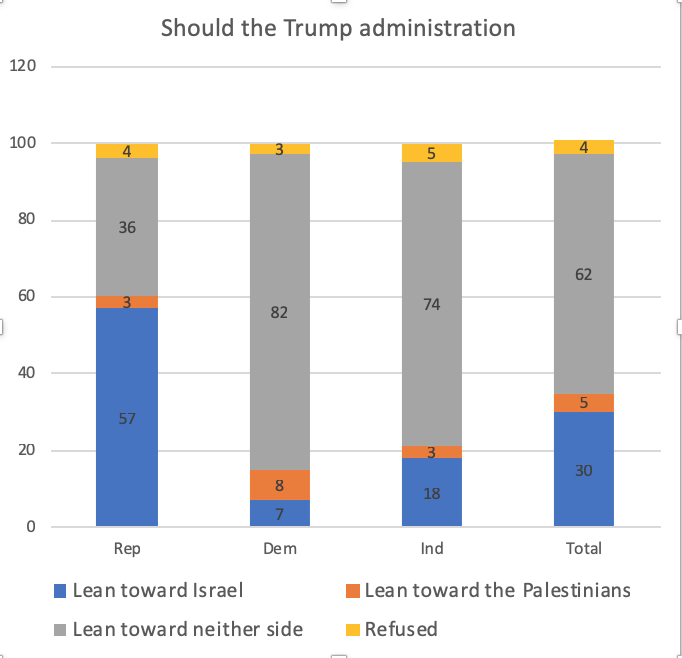1.
A new survey by Shibley Telhami of the University of Maryland shows that an increasing number of Americans support a one-state solution for Israel and Palestine. “When one considers that many Israelis and Palestinians, as well as many Middle East experts, already believe that a two-state solution is no longer possible, especially given the large expansion of Israeli settlements in the West Bank”, writes Telhami, “it’s not hard to see why more people would be drawn to a one-state solution”.
Is this new finding important? It is and it isn’t.
It’s important because it shows that Israel fails to communicate its position to American audiences, especially Democratic voters and younger voters (of which 42% support a one-state solution).
It’s not important because the one-state solution is still not a viable option, and thus not an option.
2.
Telhami conducts his poll every year, and almost each time I write critically about it. This is because his polls, while pretending to be impartial, in fact raise the suspicion that they are an act of advocacy for certain positions.
Take the question of the one-state solution. What it offers is a mirage. “A one-state solution: A single democratic state in which both Jews and Arabs are full and equal citizens, covering all of what is now Israel and the Palestinian Territories.”
Sounds good? It does. In fact, I see no reason why Americans would not support such solution to a nagging problem. But what would happen had we told them the truth: “A one-state solution: An attempt to establish a single state that is likely to result in Jews and Arabs constantly fighting for control and spilling even more blood than today.” Would Americans still support it?
3.
Another choice offered to Americans is this: Do you favor the Jewishness of Israel more than its democracy” or “Israel’s democracy more than its Jewishness.”
Are you surprised to learn that, when presented with this false dichotomy, most Americans favor Israel’s democracy?
4.
Telhami argues (in Foreign Policy) that “What many read as a rising anti-Israeli sentiment among Democrats is mischaracterized; it reflects anger toward Israeli policies – and increasingly, with the values projected by the current Israeli government.”
I am not sure what this means. I am not sure what the difference is between “anti-Israel sentiment” and “anger towards… the values…” If someone is against the political choices of most Israelis, and against the values that most Israelis believe in, and against the policies most Israelis want – does it still not make him or her anti-Israel?
The trick Telhami uses here (and he is not alone in doing this), is placing the bar for being anti-Israel so high, that it becomes almost impossible to reach. In his book, only a person that calls for the elimination of Israel, or the destruction of it, is worthy of this title. That’s very convenient for people who want to vehemently oppose Israel without being tagged anti-Israel.

5.
I know that it’s becoming popular to argue, in left-wing circles, that being anti-Israel is not akin to being anti-Semitic.
But look at this question, and tell me if it doesn’t make you feel somewhat uneasy: “How much influence do you believe the Israeli government has on American politics and policies?”
The answer, of course, is that the Jews (and by this we mean the Jews of Israel – not the good Jews of America) might have too much influence. 55% of Democrats think they do. 44% of young Americans think they do. Would they also say that countries such as Russia, Saudi Arabia, Britain, or China have too much influence on American politics? I bet many of them would – but Telhami didn’t ask.
6.
Americans want fairness, and hence many of them expect their government to “lean toward neither side” when “mediating the Israeli-Palestinian conflict.”
But how does one measure a “leaning?” Here is example: If the US government says “we would not tolerate Palestinian suicide bombers killing innocent people in Tel Aviv” – does this count as “leaning” towards Israel, because it’s critical of something that only Palestinians do? Another example: If the US government says, “we believe that Palestinian insistence on a right of return imperils any prospect for a successful peace process” – does this count as “leaning” towards Israel, because an impartial position would be to say “let’s compromise on a right of return for half the people”?
In other words: what if the US government does not “lean” towards the Israeli position but rather towards to more reasonable position that tends to be the Israeli position? Would Americans want their government to lean towards an unreasonable position for the sake of being impartial?






















 More news and opinions than at a Shabbat dinner, right in your inbox.
More news and opinions than at a Shabbat dinner, right in your inbox.